More than 66 million years ago, the sea in our regions was six degrees warmer than today, a temperature which had consequences for the marine life living there, according to a team of scientists. The sea back then was probably full of algae in the summer, a fate that may well await the rapidly warming North Sea, they warn.
Due to climate change, it is not only getting warmer on land, but also at sea. But what effect will this warming have on marine life? And on the weather?
The team of palaeoclimatologists, researchers of past climates, led by Johan Vellekoop from KU Leuven, suggest that, if the world succeeds in limiting global warming to 2 degrees Celsius, the surface of the ocean will already be about a degree warmer by 2100 than it is today.
For the relatively shallow North Sea, things are going even faster: some scientists already predict a warming of five degrees by 2100, compared to 1970. Because seawater retains a lot of heat, this temperature rise will continue long after carbon emissions are reduced.
This has consequences for the sea level, which will rise by two to six meters in the next 2000 years in the scenario of two degrees Celsius warming.
But it also has consequences for life in the oceans. And that is exactly what the team of international scientists have investigated. The result of their work was published recently in the scientific journal Climate of the Past.
Related News
- Global warming poses imminent and ‘extreme’ risk to 71% of agriculture
- People in Western Europe most pessimistic about direction world is going in
- Rising temperatures cause extreme swings in weather patterns, experts say
During the Late Cretaceous period, some 66 million years ago, volcanoes spewed out large amounts of greenhouse gases, warming both the atmosphere and oceans and making sea levels rise. Belgium was also completely underwater, submerged under a limestone-rich ocean called the Kalkzee.
The Kalkzee looked more like the Mediterranean Sea than our North Sea. Vellekoop and his colleagues say that it had on average a temperature of 20 degrees. For comparison: the North Sea reaches maximum temperatures around 22 degrees in the summer, and minimum temperatures of five to six degrees in the winter.
"In a few tens of thousands of years, the sea warmed up by almost 6 degrees. That's a lot," says Vellekoop. "Due to the warming of the seawater, the ocean current changed, making our region more strongly under the influence of water from the south, which is now the Mediterranean. As a result, the water became even warmer, but also much saltier. The ocean currents and climate change reinforced each other."
New reefs
Along with the warmer and saltier water, newcomers also swam into our sea. "While before there were hardly any corals, whole reefs of warm water corals suddenly appeared,” adds Vellekoop. “And southern squid species also appeared here."
But the most notable newcomer was a less desirable visitor. "One specific group of algae experienced a huge explosion. In the summer, the entire sea was probably covered with algae. That must have been a mess!"
Whether it was really harmful to marine life is not certain. But it could not have been ideal. "When you see something like that, it's usually a bad sign,” the scientist says. “You want diversity, but here, one species dominated the entire ecosystem."
Belgium same latitude as Canada
Even more surprisingly, warming seawater may also have disrupted local weather patterns as ocean currents changed.
"In Western Europe we have a very temperate climate with winters that are not very cold and summers that are normally not very hot," Vellekoop illustrates.
"However, we are at the same latitude as Canada, where it gets -20 degrees Celsius in winter. That's because we're under the influence of the Gulf Stream. Now suppose that the Gulf Stream were to disappear completely due to climate change - which we do not expect - then it would be a lot colder here in Belgium."
So, should we prepare ourselves for a North Sea full of algae and squid, by 2100?
That comparison is not so easy to make, says Vellekoop. "We are investigating how a world that is six degrees warmer differs from the world that came before it. But how quickly that happens, and what exactly happens during that change, is difficult to determine."
The climate change he studied occurred over a period of tens of thousands of years. This time the same warming will occur on a time scale of centuries, a hundred times faster. But it is clear that marine life will inevitably look different.

